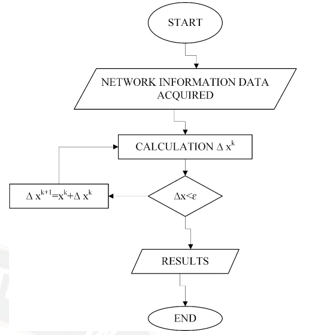Grey Wolf Optimizer and Cuckoo Search Algorithm for Electric Power System State Estimation with Load Uncertainty and False Data
Main Article Content
Abstract
State estimate serves a crucial purpose in the control centre of a modern power system. Voltage phasor of buses in such configurations is referred to as state variables that should be determined during operation. A precise estimation is needed to define the optimal operation of all components. So many mathematical and heuristic techniques can be used to achieve the aforementioned objective. An enhanced power system state estimator built on the cuck search algorithm is described in this work. Several scenarios, including the influence of load uncertainty and the likelihood of false data injection as significant challenges in electrical energy networks, are proposed to analyse the operation of estimators. The ability to identify and correct false data is also assessed in this regard. Additionally, the performance of the presented estimator is compared to that of the weighted least squares, Cuckoo Search algorithm and grey wolf Optimizer. The findings demonstrate that the grey wolf Optimizer overcomes the primary shortcomings of the conventional approaches, including accuracy and complexity, and is also better able to identify and rectify incorrect data. On IEEE 14-bus and 30-bus test systems, simulations are run to show how well the method works.
Article Details
References
S. Acharya, S. Ganesan, D. V. Kumar, and S. Subramanian, “A multi-objective multi-verse optimization algorithm for dynamic load dispatch problems,” Knowledge-Based Systems, vol. 231, p. 107 411, 2021.
M. Ahmadi Jirdehi and V. Sohrabi-Tabar, “State estimation in electric power systems based on adaptive neuro-fuzzy system considering load uncertainty and false data,” Iranian Journal of Electrical and ElectronicEngineering, vol. 17, no. 3, pp. 1722–1722, 2021.
X. Bu, W. Yu, L. Cui, Z. Hou, and Z. Chen, “Eventtriggered data-driven load frequency control for multiarea power systems,” IEEE Transactions on IndustrialInformatics, 2021.
H. Faris, I. Aljarah, M. A. Al-Betar, and S. Mirjalili, “Grey wolf optimizer: A review of recent variants and applications,” Neural computing and applications, vol. 30, no. 2, pp. 413–435, 2018.
F. Fraternali, B. Balaji, D. Sengupta, D. Hong, and R. K. Gupta, “Ember: Energy management of batteryless event detection sensors with deep reinforcement learning,” in Proceedings of the 18th Conference on EmbeddedNetworked Sensor Systems, 2020, pp. 503–516.
P. Hao and B. Sobhani, “Application of the improved chaotic grey wolf optimization algorithm as a novel and efficient method for parameter estimation of solid oxidefuel cells model,” International Journal of Hydrogen Energy, vol. 46, no. 73, pp. 36 454–36 465, 2021.
H. Jahangir, H. Tayarani, A. Ahmadian, et al., “Charging demand of plug-in electric vehicles: Forecasting travel behavior based on a novel rough artificial neural network approach,” Journal of cleaner production, vol. 229, pp. 1029–1044, 2019.
X.-B. Jin, R. J. Robert Jeremiah, T.-L. Su, Y.-T. Bai, and J.-L. Kong, “The new trend of state estimation: From model-driven to hybrid-driven methods,” Sensors, vol. 21, no. 6, p. 2085, 2021.
D. Krishna, M. Sasikala, and R. Kiranmayi, “Fopi and fofl controller based upqc for mitigation of power quality problems in distribution power system,” Journalof Electrical Engineering & Technology, vol. 17, no. 3, pp. 1543–1554, 2022.
Y. Song and D. Ye, “Optimal stealthy attack against stochastic event-based scheduling for remote state estimation in cyber-physical systems,” International Journalof Robust and Nonlinear Control, vol. 32, no. 6, pp. 3511–3526, 2022.
S. K. Kotha and B. Rajpathak, “Power system state estimation using non-iterative weighted least square method based on wide area measurements with maximum redundancy,” Electric Power Systems Research, vol. 206, p. 107 794, 2022.
N. M. Manousakis and G. N. Korres, “Application of state estimation in distribution systems with embedded microgrids,” Energies, vol. 14, no. 23, p. 7933, 2021.
X. Li, C. Jiang, D. Du, W. Li, M. Fei, and L. Wu,“A novel state estimation method for smart grid under consecutive denial of service attacks,” IEEE SystemsJournal, 2022.
R. Mart?nez-Parrales, O. Romay, C. Fuerte-Esquivel, and B. Alcaide-Moreno, “Static state estimation with inequality constraints in a complementarity framework for detecting infeasible operation states,” Electric PowerSystems Research, vol. 195, p. 107 129, 2021.
N. Mohammed and M. Ciobotaru, “Adaptive power control strategy for smart droop-based grid-connected inverters,” IEEE Transactions on Smart Grid, vol. 13, no. 3, pp. 2075–2085, 2022.

